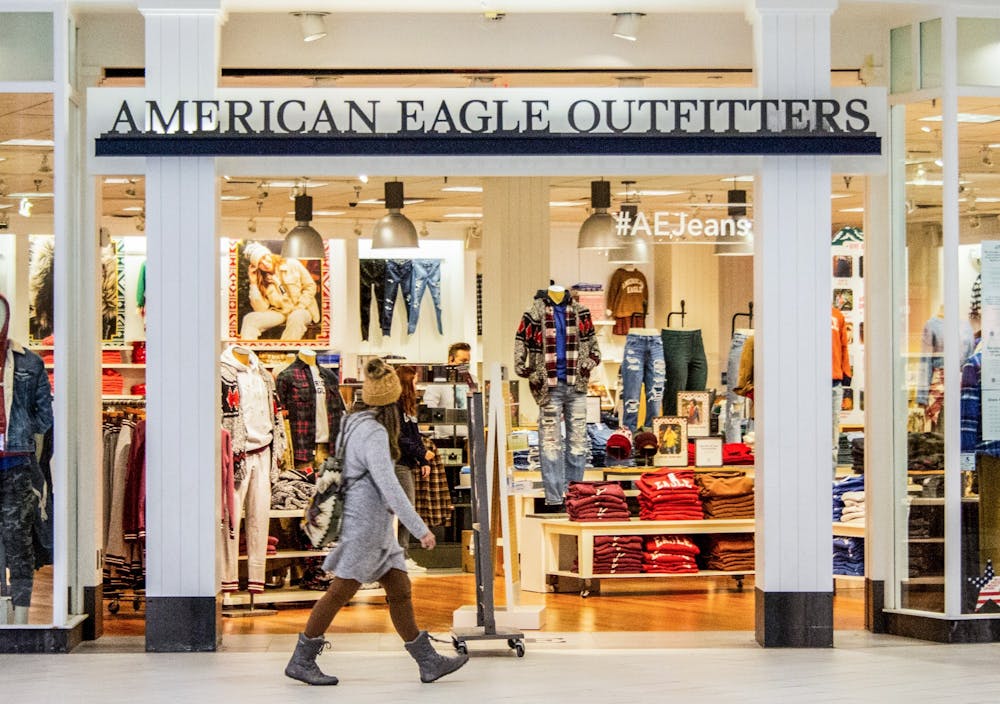One of the first times I was made aware of my size was when I was 11 years old. I went into Justice, a store beloved by everyone I knew, and they didn’t carry my size. I instantly felt gawked at and excluded. The sad truth is this feeling has yet to disappear because let’s face it: The fashion industry doesn’t always cater to bigger bodies.
Despite this upsetting reality, American Eagle has been my rock when I’ve felt like no other store supports me, especially given its 2019 decision to offer up to a size 24 jean in store. But a few weeks ago, my positive perspective was dampened when I stepped into American Eagle at the College Mall and was told that now, the largest jean size they’ll carry in store is a 16.
American Eagle’s decision to only sell plus sizes online merely adds to the lack of safe spaces for plus-sized people and continues to cater to the idealized body type.
Honestly, going into the store and only finding two returned jeans in my size was shocking. Being told the news of its new and exclusive practice was even worse. Why would a popular chain suddenly hop on this discriminatory bandwagon?
I still don’t have the answer, and I don’t know that I ever will. A University of Melbourne study on body positivity said #bodypositive had around 12.6 million Instagram posts last year. Take a look at the amount of posts under that hashtag right now. It’s grown by more than 4 million. In the wake of this rapidly growing movement, this regression in American Eagle’s previous progress perplexes me.
Take a look at American Eagle’s sizing chart. If the largest women’s jean size American Eagle carries in store is a 16, which falls more than 4 inches short of women's average waist size, they are catering to smaller-than-average women. According to the Centers for Disease Control and Prevention, the average waist of women 20 and older is 38.7 inches, which is a little larger than a size 20 at American Eagle.
I can confidently say my waist is larger than the average woman’s. This restrictive policy means I will no longer be able to have an at-ease shopping experience at American Eagle in College Mall. The lack of future, positive experiences is extremely damaging since I’ve already found the thought of shopping to be mentally and emotionally draining as a young woman in society.
Not allowing me, or the average person, to comfortably find a new pair of jeans in a safe environment plays into weight bias and fatphobia. The World Health Organization defines weight bias as “negative attitudes towards, and beliefs about, others because of their weight.”
American Eagle would obviously never come out and say they’re a biased company, but it’s the only feasible explanation. In a college town like Bloomington, there’s absolutely no rhyme or reason, socially or economically, to exclude the majority of customers from having a worthwhile experience in its stores.
Yet, it’s taking away worthwhile experiences for plus-sized people to preserve the public’s perspective of them. Why include plus sizes when they are so stigmatized, right?
It’s utterly disappointing that my local American Eagle is now holding me to the same unattainable beauty standard that much of society has held me to since the beginning of my time. Some bodies aren’t meant to be thin and “perfect.” Mine is one of those.
We need to fight this rising opinion that plus-sized bodies don’t deserve a place in fashion. Someone who is bigger can rock the same exact thing as the next person, I promise. We just have to break that stigma.
Elizabeth Valadez (she/her) is a freshman studying English and political science. She is a member of Chi Alpha.






